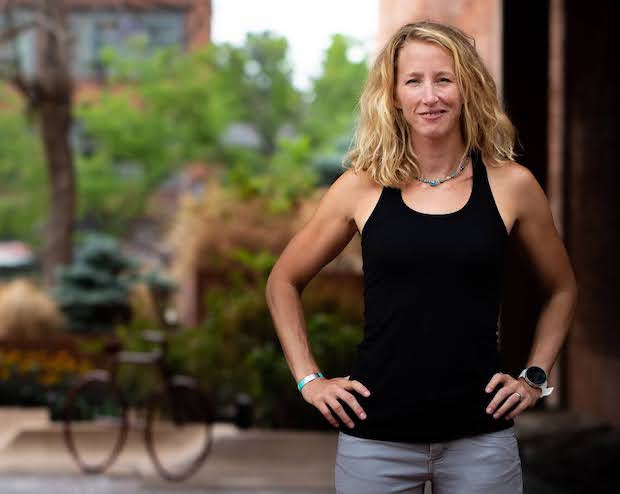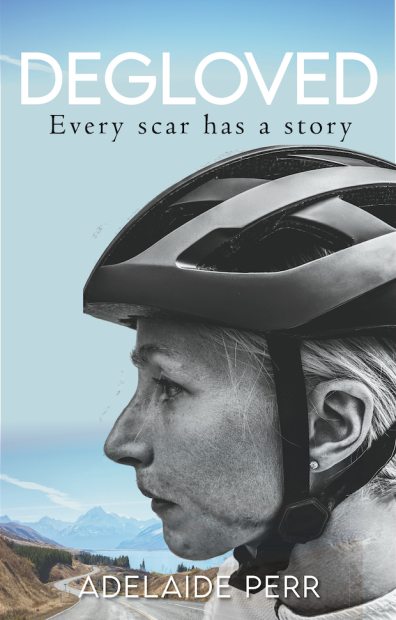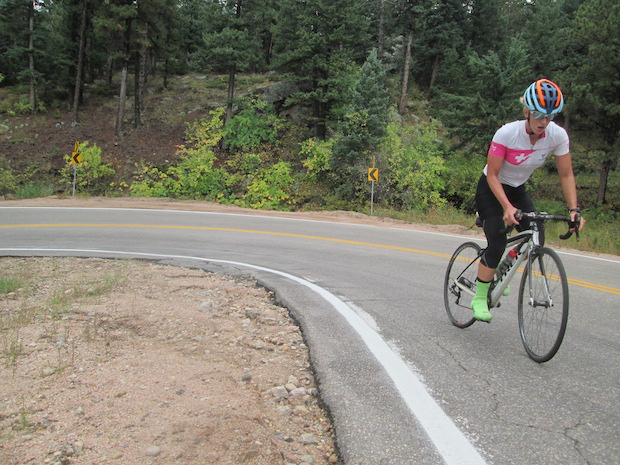Every Scar Has a Story; This Story is Adelaide Perr’s

Adelaide Perr is a coach, former professional triathlete, and a recently published author. Degloved is her story of mental illness and recovering from a cycling crash that nearly took her life. We sat down with her to discuss a variety of topics.
Slowtwitch.com: Congrats on the publication of Degloved. Tell us a little bit about what you have been doing since the book release? Are you still racing professionally?
Adelaide Perr: The first week after the book was released I was online substitute teaching for a middle school math class. This week I’ve been going on some good runs with our dog, Maybellene, and I’ve been brainstorming for a virtual book tour.
I don’t anticipate racing as a professional in the future. Training at a high level is fun for me. It keeps my bipolar in check and I enjoy pushing myself. However, between PTSD and injuries, I haven’t been proud of any of my triathlon races since becoming a professional. I’d rather compete against myself and enjoy the camaraderie when I’m with others.
Slowtwitch.com: What was your goal in writing Degloved?
Adelaide Perr: Since a young age, I have really enjoyed learning and teaching. In the simplest of terms, the book is my chosen medium for sharing what I learned along the way. I was also initially driven to write out of a huge sense of injustice. When a cyclist is injured or killed in a crash, the police reports and the newspaper have control over the story. The narrative surrounding my crash was not accurate and that bothered me.
I actually do not often read memoirs, but at the time I had two favorite memoirs: Riding Rockets and Naked in DaNang. One of my main goals throughout was to write something that I would want to read myself. When I began the book, I thought I would inject more humor into it like both of those books did, but when I was working through drafts of the book with my writing coach or Kennett [her husband], both guided me to really delve in more—to access the emotions that went with each story. As such, I think the book actually has a bigger role in the conversation about mental health than I initially intended.

Slowtwitch.com: In the book you talked about walking away from writing on several different occasions, what made you come back and finish?
Adelaide Perr: To understand what made me come back and finish the book, I should share some of the reasons I walked away. Sometimes I walked away from the book out of fear it would not meet my self-imposed expectations. As with any new project a person takes for the first time, there was a steep learning curve and at times I had to walk away to learn the craft better. There were points I gave up on the book because I was sick of living in the world of the crash. Six years was also an incredibly long time for me to pursue one goal and I needed to see success in other areas of my life for reasons of self-confidence. Racing triathlon took that role.
As any triathlete can attest to, training is not only time-consuming, but it zaps your energy and leaves little for creative thinking. I fell into a cyclical pattern of picking up the book in the off-season and dropping it when the memories were too difficult to relive and still effectively train outdoors. Deep down, I do not think I really gave up on the book until maybe this December when I was struggling to find a publisher. Luckily, I had already made initial contact with Trigger Publishing at that point and it just took time to hear back!
Slowtwitch.com: In your book, you talk about the traffic safety laws surrounding cyclists, specifically in Colorado. What do you think the endurance community can do to help promote safer cycling? Do you still ride with a video camera?
Adelaide Perr: I do not ride with a video camera because I don’t want to start each ride by turning it on. To me, that sets up an expectation that the ride will go sour and it is not worth it.
There are two things I think that people within the endurance community can do to promote safer cycling. One, I have been the passenger in a car with other cyclists/triathletes who have told me outright that they will not ride at certain times of the day because of traffic, but then they start to use their phone in the car as though they are immune to being distracted drivers themselves.
We need to lead by example. Even talking on the phone through your car speakers (completely hands-free) is a form of distracted driving. Here’s why: If you and I are in the car together having a conversation and an ambulance, deer, or erratic driver comes into view, chances are that, as a passenger, I will at the very least shut up so you can concentrate. I may even be able to point out a hazard to you. However, if you are driving and holding a conversation with me not in the car, I do not have any awareness of traffic conditions and will continue to take your focus away from the road when dangers exist.

Second, it is important for endurance athletes to be at local meetings involving bike lanes, vision zero etc. It is easy (pre-COVID) to show up for a ride near me and see 50+ riders. I wish more of those people would attend a Transportation Advisory Board Meeting. The meetings are about as exciting as they sound, but the board gives important guidance to the City. That being said, I appreciate that people have other commitments and dedicate their time to other forms of advocacy in the world. It just seems a little like self-preservation for cyclists to care about road safety and infrastructure in particular.
Slowtwitch.com: Mental Health is a huge portion of your story. As a coach and athlete, what advice would you give to others who are struggling?
Adelaide Perr: Exercise is a solid coping mechanism for life, regardless of whether someone has a mental health diagnosis or not. However, I think we have all seen athletes who use exercise as their sole coping mechanism and exercise ceases to be balanced or healthy.
As a coach, I think it is important to encourage athletes who still struggle with mental health to focus on other areas where they can fill their tank. It can be as simple as improving sleep, enjoying friendships, and quality nutrition.
I mention in the book that I crave the momentary feeling after a race or a hard workout. Being an athlete is the place where I have the highest confidence, but that sensation is fleeting for many of us, and I think it can mess with people’s mental health. Some people might need a separate creative outlet or a job where they feel more consistent success.
We all share the human experience. No person survives into adulthood without having had experienced some crippling emotions at one point or another. The cause of what is so difficult may vary, but if you are struggling with mental health do not be afraid to reach out for help. Chances are, someone will be able to empathize and offer support.
Slowtwitch.com: Many endurance athletes have life altering injuries. What do you think made you successful in returning to the race course?
Adelaide Perr: Yes, and many return to racing. I do not want it to seem like I am an extraordinary person for continuing to ride outside. Several things contributed to my successful return to cycling. One, I had the most amazing support from Kennett. He rode with me the first time back on the bike, my first time past the crash scene, and on so many other early rides that were emotional. Second, I was entrenched in the cycling community. It was my sport, I had given up my car, and I worked in the bike industry. I was not about to voluntarily lose something I valued so much. A good chunk of it might come down to my stubbornness too.
Slowtwitch.com: What is still on your bucket list?
Adelaide Perr: Bike packing, perhaps Embrunman, which we were supposed to do this year, or another extreme triathlon, and a marathon PR. You never know though—I joke that all it takes is a friend suggesting we do a race together along with a discount entry code! I also have some ideas for promoting another race in the future.


Start the discussion at slowtwitch.northend.network